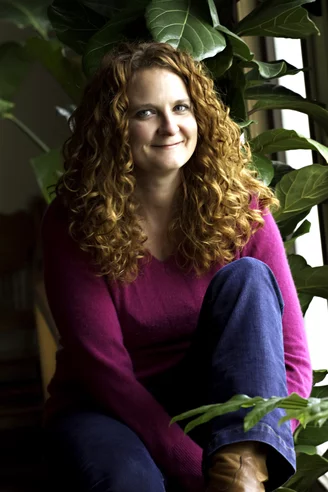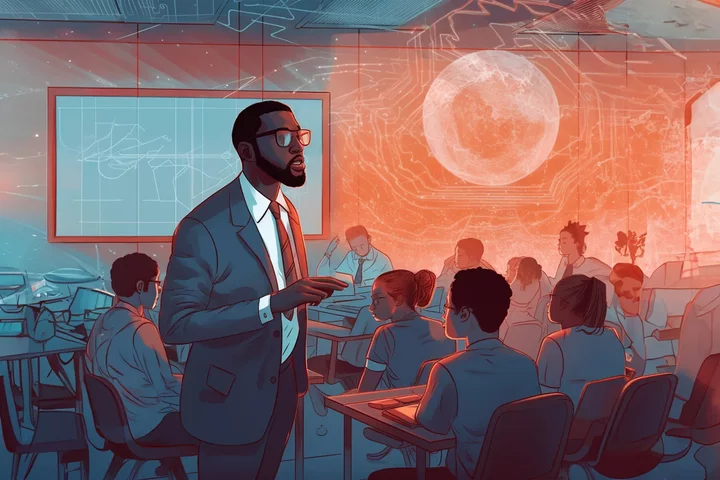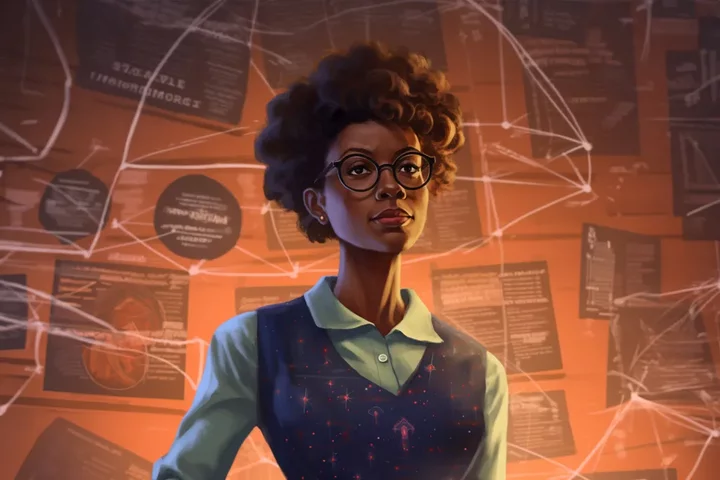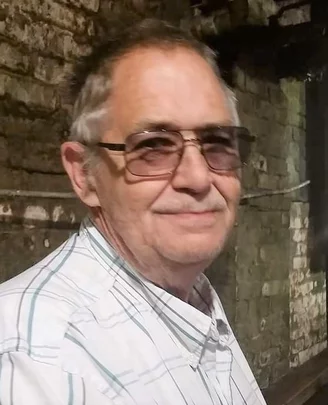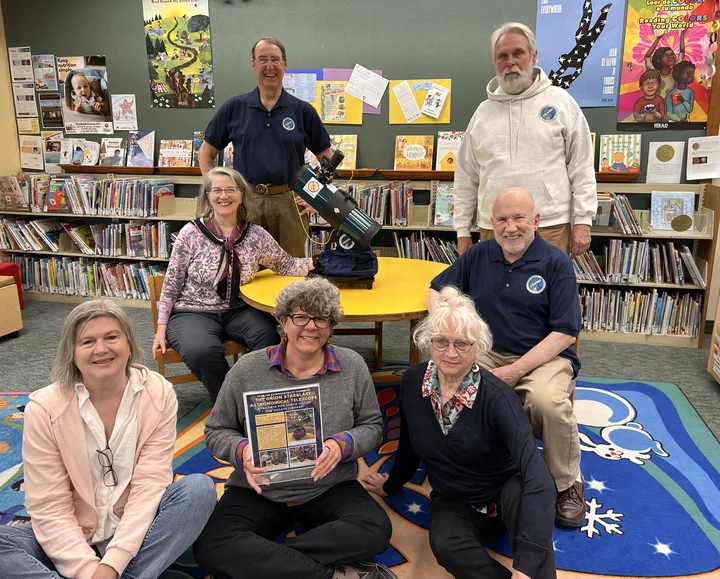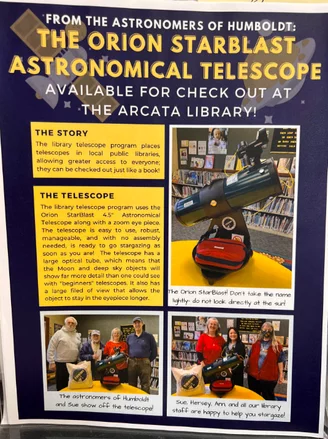Jessica McGuinty, Former KHUM DJ and Founder of Jessicurl, Dies at 47
Hank Sims / Wednesday, June 14, 2023 @ 11:02 a.m. / Obits
Jessica McGuinty, a former Humboldt County resident best known as the founder of the Arcata-based Jessicurl company, has died at age 47, according to a Facebook post published by her husband, Chris Spohn, this morning.
Throughout her life McGuinty had lived with Ehlers-Danlos syndrome, and the chronic illness finally claimed her life on Saturday, Spohn wrote.
A lifelong roamer and traveler, forever moving from this place to that, McGuinty founded Jessicurl in 2002, after failing to find commercial shampoos and conditioners that suited her hair. Research on early Internet message boards for women with curly hair led her to develop her own, natural recipes, and she soon began bottling her formulas and selling them to others.
Jessicurl grew through her canny marketing — she never tired of telling stories about the merciless cruelties of the straight-haired children at her primary schools in Ontario, Canada — and soon her fledgling company moved into a factory space on West End Road. McGuinty would travel to trade shows to bond with her fellow “curlies,” and eventually became a go-to source when big media wanted to present anything about the plight of the curly-haired.
In 2010 she sold part of the company to a local investment group, partly so that she wouldn’t have to manage its day-to-day operations. She was much happier to be out meeting people and marketing her products.
In 2015, hoping that a warmer climate would improve her health, she moved to Medford and later to southern California, where she met and married her husband. Throughout, she kept her stake in the company she founded, and continued as its public face.
McGuinty was an early colleague for many of us at the Lost Coast Outpost. For years she hosted the weekly “Global Grooves” program on KHUM radio, our sister station, in which she would play music from a different place in the world each week. She was the world number one fan of the Bellingham, Washington-based Yogoman Burning Band, which seemed to play Humboldt three or four times a year for a while there, probably because she made them do so.
She was well and widely loved.
In 2013, McGuinty spoke at a TEDx event about the random, unforeseeable effects that your actions can have on strangers. The recording of that talk can be found below.
BOOKED
Today: 3 felonies, 10 misdemeanors, 0 infractions
JUDGED
Humboldt County Superior Court Calendar: Today
CHP REPORTS
Sr299 / Glen Rd (RD office): Assist CT with Maintenance
ELSEWHERE
County of Humboldt Meetings: MMAC (McKinleyville Municipal Advisory Committee)Special Meeting Agenda - Hybrid Meeting
RHBB: Local Farmer Running Conservative Grassroots Campaign for California Governor
RHBB: Youth Football Commissioner Resigns Following Leadership Critique Amid a Troubled Season
California Professors Test Out AI in the Classroom, Even as Cheating Debate Continues
Rocky Walker / Wednesday, June 14, 2023 @ 7:22 a.m. / Sacramento
Illustration generated via artificial intelligence program Midjourney, and finalized with Adobe Photoshop (Beta)
This spring, as debates were raging on college campuses about the proper role of generative AI in higher education, Diablo Valley College adjunct professor Frako Loden created an assignment to see how students in her American Cinema class interacted with ChatGPT.
For their final opinion piece of the semester, they were to pick a discussion question about the 1950’s movie “A Place in the Sun,” insert it into ChatGPT as a prompt, and then grade the response themselves. The AI got key details of the plot wrong in some cases, Loden said.
In the film, for example, protagonist George takes his girlfriend to a lake and she falls in and accidentally drowns, but ChatGPT says that he purposely killed her there. “That may be a subtle point, but it really does figure at the end when you evaluate his character,” said Loden, “ChatGPT kind of runs rough over that and suggests that he was planning it from the start and that he’s an evil dude.”
Loden’s assignment illustrates not only the limitations of ChatGPT — Loden said she found in her own research that many details of movie plots it gives are not only false, but “ideologically loaded” and “maybe even racist” — but how professors are increasingly experimenting with its use in the classroom. California’s public higher education systems have not yet created a formal policy regarding the use of generative AI, which can create images and text that are nearly indistinguishable from those made by humans. That leaves professors in the role of watchdog, preventing breaches of academic integrity. While some focus on cracking down on cheaters, a growing number have decided that the technology is here to stay, and are assigning work that seeks to convey to students the benefits of AI as a research tool while acknowledging its limitations and propensity for error.
“Faculty have to come to a decision, whether it’s in California or nationwide. And the decision is, do you want to adopt?” said Tony Kashani, a professor of education at Antioch University who is writing a book about the use of AI in the classroom. “On campus there’s a lot of contention about this.”
When it comes to AI, technology has moved more quickly than ethics and policy, said Kashani. He said bots like ChatGPT show great promise as a “writing consultant” for students. “It’s not often that students have a chance to sit down with a professor and have long discussions about how to go about this paper, that paper, how to approach research on this topic and that topic. But ChatGPT can do that for them, provided…they know how to use the right ethics, to use it as a tool and not a replacement for their work.”
That’s the approach taken by Stanford sociology professor David Grusky, whose syllabus for a recent public policy class allowed the use of AI-generated text in assignments under the stipulation they be cited in the same way a conversation with a human would be.
“It’s a conversation that can be evoked at will. But it’s not different in the content,” said Grusky. “You still have to evaluate what someone says and whether or not it’s sensible.”
He believes that AI can help teach students to evaluate the quality of sources, serving academia well in the long term. “I believe our job typically in kind of the world of undergraduate instruction is to try to help people become more thoughtful, more rigorous, more analytic.”
Stanford, after a push from professors, created a baseline policy forbidding the use of AI to aid in the completion of assignments unless otherwise allowed in a class syllabus. And some California college professors remain skeptical.
“I see it more of a problem than a benefit,” said Santa Rosa Junior College history and political science instructor Johannes Van Gorp.
The advent of generative AI has increased the workload of instructors who seek to stop cheating, he said, especially since software that checks for AI-generated content is imperfect.
“Faculty have to come to a decision, whether it’s in California or nationwide. And the decision is, do you want to adopt?”
— Tony Kashani, professor of education, Antioch University
Van Gorp has adopted a policy forbidding the use of artificial intelligence in his classes, running nearly every assignment that gets turned in through three different AI checkers to build confidence in the results he gets.
“At first I was reporting (AI use) through the system, but it was so ubiquitous that I just started, as bad as it sounds, giving zeros on the assignments with a note: ‘This is AI generated.’”
Still, Van Gorp said he has to acknowledge that “the world is shifting.”
“Things like (the grammar-checking tool) Grammarly or whatnot, those are AI programs as well. And so where do you draw the line? And I’m not quite sure I’ve figured that one out. And certainly the institutions haven’t.”
California State University’s Academic Senate, which represents faculty, passed a resolution in March calling for a working group on artificial intelligence in higher education, to be formed by the end of August. The working group would examine AI’s limitations, opportunities for professional development of faculty, and how to ensure academic integrity, coordinating the university’s response across campuses.
To make their point, faculty used ChatGPT to draft part of the resolution itself. “What level of academic dishonesty would this constitute on a CSU campus?” the writers asked, adding, “This resolution calls upon the CSU to consider how best to leverage this technology, understanding that AI will inevitably change the nature of education independent of any action the system takes.”
Generative AI is out there and will be here in the future, said Academic Senate Chair Beth Steffel in an interview. “If we ignore it or try to ban it, it is probably to everyone’s detriment.”
Faculty at the California Community Colleges have also pledged to develop a framework that colleges can use to create policies on AI by spring 2024. The University of California has had an AI working group since 2020, which has in the past recommended the technology’s use in counseling, student retention, admissions and even test proctoring, as well as calling for individual UC campuses to set up councils to oversee their use of AI.
A March survey by the college-ranking website BestColleges found that 43% of college students say they have experience using AI, such as Chat GPT, with 22% saying they’ve used it to complete exams or assignments.
“I imagine that number is going to grow,” said Camille Crittenden, executive director at UC Berkeley’s Center for Information Technology Research in the Interest of Society and a member of the UC workgroup. “So the teachers might as well be involved in helping them to use it responsibly, figuring out how to actually double check citations and make sure that they’re real.”
As universities grapple with setting policy, professors are flocking to social media to vent and ask questions. Many of the conversations show a split between professors who want to integrate the use of AI and those who fear allowing it into the classroom.
“I just caught a student using ChatGPT to answer questions on online quizzes,” one professor posted to Pandemic Pedagogy, a Facebook group made to assist faculty in navigating online teaching. “On my syllabus, I say that students’ work must be their own and plagiarism will result in a failing grade, but I don’t mention using these kinds of platforms…What should I do?”
(The Facebook group is invitation-only, but some posters gave CalMatters permission to cite their comments.)
Some wrote about the seeming futility of trying to catch cheaters, given the unreliability of software designed to flag AI-generated content.
“We should avoid assignments that try to ‘harness’ ChatGPT or other AI’s,” another commenter argued, adding that the services might not remain free of charge and could start returning answers that are shaped to benefit advertisers.
Illustration generated via artificial intelligence program Midjourney, and finalized with Adobe Photoshop (Beta)
Elizabeth Blakey, an associate professor of journalism at Cal State Northridge, allowed master’s students in her mass communications class to use ChatGPT to help draft research proposals. “It’ll give you information, it’ll give you names, maybe some ideas or vocabulary words that you didn’t think of,” she said in an interview. “And then you can take it from there and use your own creativity and your own further research to build on that.”
She believes it helped reduce her students’ anxiety about the tool and taught them a new skill they can take into the workforce.
Beatrice Barros, one of Blakey’s students, said ChatGPT came in handy when she changed her project topic halfway through the semester but was nervous about not having enough time to complete it. Using the AI, she said, “helped me with the head start, like a motivation.”
But she learned how to navigate what the AI gave her with skepticism. “Sometimes it was very, very wrong,” she said. “It made me more aware that ChatGPT can sometimes trick you, maybe get you in trouble if you don’t read content.”
Her overall takeaway? “Sometimes it’s better to do your homework.”
“ChatGPT can sometimes trick you, maybe get you in trouble if you don’t read content. ”
— Beatrice Barros, Cal State Northridge student
Blakey’s colleague David Blumenkrantz gave students in his visual communications class a choice about whether to use AI to design a magazine. They could write their magazine’s proposal and premise, or have ChatGPT write it for them. AI-generated images could grace the magazine’s cover, with students adding in the typeface and titles over it. The only stipulation: that students explain which parts were AI-generated and why.
About a third of the class chose to use AI for the assignment, he said.
Blumenkrantz said he is currently partnering with a Nairobi University in Kenya to build up their photojournalism program and that his 63-page curriculum was mostly compiled from AI-generated content. He gave ChatGPT prompts, changed the responses to go more in depth into each topic, and fact checked them, he said. He spent weeks making the curriculum, he said, when it would have taken months without the AI-generated research, a result he called “astonishing.”
Jenae Cohn, the executive director of the UC Berkeley Center for Teaching & Learning, which helps professors design effective instruction, said she and her staff often hear from faculty like Blumenkrantz, who “want to understand better how to use AI in creative ways in their teaching.”
“On the other end of the spectrum, we have a lot of questions about how students are using AI to cheat. There’s a lot of concerns about academic integrity.”
As for her own take, she said, “I don’t think that AI is going to necessarily destroy education. I don’t think it’s going to revolutionize education, either. I think it’s just going to sort of expand the toolbox of what’s possible in our classrooms.”
###
Walker is a fellow with the CalMatters College Journalism Network, a collaboration between CalMatters and student journalists from across California. This story and other higher education coverage are supported by the College Futures Foundation.
CalMatters.org is a nonprofit, nonpartisan media venture explaining California policies and politics.
‘Down to Our Last Dimes’: State Workers Say California Paychecks No Longer Cover the Bills
Jeanne Kuang / Wednesday, June 14, 2023 @ 7:09 a.m. / Sacramento
Tammy Rodriguez, 52, an employee with the state Department of Motor Vehicles in San Luis Obispo. Rodriguez has 27 years of state service, including five years in San Luis Obispo. June 5, 2023. Photo by Julie Leopo for CalMatters.
When Tammy Rodriguez landed a job with the California Department of Motor Vehicles 27 years ago, she felt like she had “struck gold.” It was her first job, she said, and she felt secure knowing she was earning not just a salary, but a pension for later in life.
Over the years she thought about looking for work at private companies to make more money, especially after she had a child. But she liked the other benefits of state work: the health care coverage, the flexibility of transferring departments when her family moved and the job security when she went on maternity leave.
Now, at 52, she’s feeling less financially stable. The $2,100 monthly rent she pays for the home she and her teenage daughter share eats up half her earnings at the DMV in San Luis Obispo. Halfway through each month, she takes stock of their expenses and budgets to ensure she can afford gas for her 30-mile daily commute.
“I want the stability I had before, where I don’t have to worry about (living) paycheck to paycheck,” said Rodriguez.
That sentiment undergirds the contract talks this year for the Service Employees International Union Local 1000, the largest union representing California state government workers. The union has called for a 30% raise over the next three years and the full cost of health premiums covered.
Rodriguez is active in Local 1000, which represents nearly 100,000 state government employees, from administrative staff to janitors to health care workers. Their current contracts expire at the end of June.
Can California pay?
Theirs are not the only labor demands the state has to contend with as Gov. Gavin Newsom and lawmakers seek to close a $31.5 billion hole in the budget.
Local 1000 covers nine of the state’s 21 worker bargaining units. Five other units also have contracts that are up this summer and some are also seeking raises.
In total, expiring labor agreements cover more than half the state’s workers.
“I want the stability I had before, where I don’t have to worry about (living) paycheck to paycheck.”
— Tammy Rodriguez, Department of Motor Vehicles worker in San Luis Obispo
For every $1 in potential raises there is an additional 32 cent increase in pension costs, making the 30% raise proposal total more than $3.8 billion over the next three years, the union said.
Irene Green, Local 1000’s vice president for bargaining, said there has been little response from the state on their proposals for the raise and full health coverage. California Department of Human Resources spokesperson Camille Travis declined to answer CalMatters’ questions about contract negotiations.
The union’s efforts come after teachers and staff at two large school districts held strikes this year — in Oakland and Los Angeles — netting double-digit raises.

Marchers hold signs as Ty Kovacs, a teacher for California School of the Deaf, signs to the crowd in front of the Governor’s Mansion on Sacramento on June 8, 2023. Photo by Julie A. Hotz for CalMatters.
Would state workers strike? In 2016, Local 1000 voted to strike but workers did not walk out.
“Are we considering all our options? Absolutely,” Green said. “We’re not leaving anything unconsidered at this time.”
So far Newsom’s budget proposals this year have included funding for previously negotiated raises for other state worker unions, and he has spared workers from furloughs. But his administration has said there’s little room for new spending.
“We value our workforce; we value their sacrifice, particularly over the last number of years,” Newsom told reporters in May. “And we are mindful of the inflationary environment. We’re also hopeful that they’re mindful of our current budgetary environment.”
Lagging California paychecks
Public sector employees are among a broad swath of workers demanding higher pay amid record inflation, months after many were deemed “essential” during the pandemic.
Advocates this year often point to a growing gap between wages and California’s cost of living. The United Ways of California this year sponsored a bill that would have forced the state to calculate what wages it takes to afford the basics in each county. The bill died in the Senate Appropriations Committee in May.
As the union prepared to bargain this year, it commissioned a report by UC Berkeley’s Labor Center that found more than two-thirds of workers represented by Local 1000 don’t earn enough to support themselves and one child, and 35% don’t make enough to support a family of four, even with a partner earning the same wages.
Nationally, wage growth among state and local government workers was close to or exceeded private sector wage growth from 2001 to 2010, federal data show. But after the Great Recession, in 2010, government wage growth began lagging behind private sector wages and has not caught up, said Sara Hinkley, policy research specialist at the UC Berkeley Labor Center. Tax revenue uncertainties may be why, she added.
Path to middle class
State workers in California often accept lower salaries than they would get at private businesses in exchange for a state pension, better benefits and job security. But rising costs coming out of the pandemic and wage hikes as the private sector responds to labor shortages are giving state workers pause. Is the tradeoff still a good deal?
“Whether (state employment) is a pathway towards what we traditionally think of as the middle class is, I think, more questionable now,” said David Lewin, a professor emeritus at the UCLA Anderson School of Management who studies public sector unions.
Even so, he said, public sector work is still a better deal in the Golden State than almost anywhere else. California has not made substantial cuts in state jobs or in state workers’ bargaining rights the way states like Wisconsin have.
The union says there have been other de facto cuts to state workers’ pay in California.
“Whether (state employment) is a pathway towards what we traditionally think of as the middle class is more questionable now.”
— David Lewin, professor emeritus at the UCLA Anderson School of Management
Over the last two decades, state workers have contributed more of their paychecks to health care premiums and retirement health plans. Former Gov. Jerry Brown signed a law that, among other things, made workers hired in 2013 or later pay more toward their pensions.
Contributions to health care and pensions took up 5% of a typical Local 1000 member’s paycheck two decades ago and now consume 15%, the union says. The figures are based on pay and benefits for an associate program analyst, the job category the union says is closest to its members’ median salary.
During the pandemic, the state trimmed worker pay by 9% for one year, anticipating a deep recession that did not materialize. Workers got two days off each month in exchange. In 2021 the pay and work days were restored — as were raises from the current contract that totaled 7% over three years — when the state brought in record revenues.
Stuck with side jobs
On June 8 the state workers union held a rally outside the Governor’s mansion to demand better raises. Rita Krone, a 55-year-old program analyst who helps refugees, was there.
When she got her job at the state Department of Social Services about a year ago, she thought she could finally put aside her side jobs.
But her rent is $2,200 a month and Krone, a Rocklin resident, is the wage earner and caregiver for her husband, who has a disability. She works Mondays through Fridays, then delivers groceries for DoorDash on Friday evenings and weekends.
“We’re down to our last dimes,” Krone said. “So I work seven days a week.”
Pay for analyst positions like Krone’s was 17% less than equivalent jobs in the private sector in 2021, says the California Department of Human Resources. That’s with state benefits and pension factored in.
Looking at wages alone, analysts like Krone made 30% less than market pay.
###
CalMatters.org is a nonprofit, nonpartisan media venture explaining California policies and politics.
OBITUARY: Robert Lowell Steeves, 1947-2023
LoCO Staff / Wednesday, June 14, 2023 @ 6:56 a.m. / Obits
Robert Lowell Steeves, 76, passed away suddenly in the early morning hours of June 6, 2023.
Born to Charley and Martha Steeves February 7, 1947 he was a graduate of Eureka High School in 1954. He worked many years as a baker before joining Eureka City Schools as a custodian. While he was on staff at a few schools over the years, the majority of his 35 years was spent as Lead Custodian at Lafayette Elementary School. He was a truly beloved member of the Lions staff and so proud to be part of the Lafayette family.
Robert is survived by his wife Gina, married 33 years, and daughters, Shannon Steeves, Gwen Price (Vincent), Courtney Calkins (Christian) and twin sons, Kevin and Tony Steeves as well as Dane Crawford, whom Robert thought of as a son. He also leaves grandchildren Emily, Alex, West, Lucas and Samantha, as well as his brother Carl (Caryl), nieces Trish Palmer and Nancy Curtis (Tom), nephews, Bryan Steeves, and Wayne Steeves (London), and great-nieces, Karyn, Becca, Cara, Cyd-nee and Erin. Pets Mia and Milo are missing him greatly.
He was preceded in his passing by his parents, Charley and Martha Steeves, many aunts and uncles, mother-in-law Jennie Williamson, and father-in-law Larry Williamson who considered Robert a son from their first meeting.
Robert is sure to have been greeted on the next plane by close friends Bill, Gordon, Manny and best friend, Jerry Ross. These wonderful companions were a strong presence in his life and have all been missed beyond belief, just as our Rob Rob Rob, our dad, our papa will be missed.
The Saturday after Robert was gone was to be the usual Once a Month Breakfast get together, often referred to as “The Breakfast Club.” Although he was a very shy person, not much of a social animal, Robert was in charge of the reminder calls to the usual suspects including former and current coworkers Al, Hank, Rodger, Rory, Manny, Gordon and other ECS employees. Wives were even invited sometimes. They would meet, usually at Kristina’s, to share stories of their work week, possible retirement and general town gossip like old friends do. While The Breakfast Club lost a few members over the years, the memories were full and long-lasting for all who were fortunate enough to attend.
Robert’s family would like to express our tremendous gratitude to teachers, students and staff, his “work wife” of 20 years, Rosemary Kunkler, and friends Debbie and Aaron Pierce for helping Robert come out of his shell. The Lafayette Lions made his work a second home, a place full of comfort, love, and laughter.
There will be no formal service as Robert chose to be a donor to the Willed Body Program at University of San Francisco. Instead, a picnic to celebrate Robert’s life is being planned for late summer just before school starts.
###
The obituary above was submitted on behalf of Robert Steeves’ loved ones. The Lost Coast Outpost runs obituaries of Humboldt County residents at no charge. See guidelines here. Email news@lostcoastoutpost.com.
OBITUARY: James (Jim) Thomas Alford, 1948-2023
LoCO Staff / Wednesday, June 14, 2023 @ 6:56 a.m. / Obits
James
(Jim) Thomas Alford
March
1948 – April 2023
Jim Alford passed away from heart failure April 3, 2023, just after his 75th birthday. He was born in San Francisco and grew up in Hayward and Castro Valley. Jim was the Hayward High School Farmer mascot (class of 1966). He was an outreach worker for Glide Memorial Church in San Francisco’s Tenderloin after high school and became deeply involved in anti-war organizing. Jim married Barbara Brown in 1969 (died 1973 from cystic fibrosis complications). They moved to Humboldt County in 1970 at the behest of his draft board, where Jim organized much good trouble. Jim had the option of moving at least 300 miles away or being prosecuted.
Jim did whatever he could to make money during the early years in Humboldt, ending with management of Katy’s Smokehouse in Trinidad in the 1980s. He tried to start a Farmers Market in Eureka about 1975. He was involved in Humboldt County progressive organizing and worked at the Open Door Clinic as a Vista Volunteer, where he and others outfitted a bus as a clinic that served Southern Humboldt County. Jim’s political organizing was reignited when Wesley Chesbro asked Jim to work on his campaign for Arcata City Council in 1974. Jim went on to manage Chesbro’s campaigns for county supervisor, and in 1998 Jim played a key role in helping Wesley Chesbro win election to the California State Senate.
Tom Hayden spoke in Humboldt County after his 1976 primary for U.S. Senator while organizing the statewide Campaign for Economic Democracy (CED). Jim attended, met others in the organization, and was inspired to organize Humboldt County CED. Jim subsequently ran campaigns for other Humboldt County supervisor races (Eric Hedlund, Alan Katz), McKinleyville Community Services District (Barbara Mendenhall in 1981, others later), an initiative to ban herbicide spraying along county roads, and the Assembly 1984 (Dan Hauser). After helping Eric Hedlund get elected, Jim served as his appointee to the Humboldt County Planning Commission.
Jim was recruited in 1985 to work for Willie Brown in the Speaker’s Office of Majority Services and moved to Sacramento. Jim’s second wife, Barbara Mendenhall (married in 1977), joined him a year later. Jim worked for Majority Services until 2006, frequently going off state payroll and leading numerous campaigns to elect Democrats to the Assembly in the Imperial Valley, San Diego, San Joaquin Valley, Bay Area and North Coast. He also worked on local races in numerous communities. Jim’s specialty was voter registration and getting out the vote. His work made the difference in many close Democratic races. His volunteer and paid voter registration drives throughout the state registered millions of Californians, many of them first time voters. While with the legislature he was instrumental in developing California’s initial plan for responding to a pandemic emergency.
In 2002 Jim started the field botany program at Sacramento City College and continued at Sac State, earning a B.S. degree. He tutored and mentored younger students and enjoyed working as a student assistant with professors. He attended and presented student posters at annual meetings of the Ecological Society of America. He subsequently held several botanist positions.
Jim Alford spent his life as a volunteer and paid organizer, political activist, poetry lover, natural history scholar, vegetable, flower and fruit gardener, native plant enthusiast, health tracker, fisherman of almost every variety, cat lover, music fan, movie fan, birder, electronic gamer (conquer the world, build civilization genre), and ongoing community college student - most recently focusing on literature of every era. His neighbors in Sacramento appreciate his prolific native flower garden each year.
Jim is survived by Barbara Mendenhall, sister and brother-in-law Janet and Vince West and brother Dennis Alford.
Jim’s ashes will be scattered in Humboldt County. All are invited to a Celebration of Life at the Humboldt Unitarian Universalist Fellowship Hall, 24 Fellowship Way (off of Jacoby Creek Road), in Bayside on Sunday, June 25, 2023, at 3 p.m. Humboldt CED and Jim Alford memorabilia will be on display. Please bring hors-d’oeuvres and light desserts to share at the potluck. This is a zero waste event, so please take home your leftovers and tableware. Please contact jimalfordcelebration@gmail.com for additional information.
###
The obituary above was submitted on behalf of Jim Alford’s loved ones. The Lost Coast Outpost runs obituaries of Humboldt County residents at no charge. See guidelines here. Email news@lostcoastoutpost.com.
HUMBOLDT TODAY, With John Kennedy O’Connor | June 13, 2023
LoCO Staff / Tuesday, June 13, 2023 @ 5:12 p.m. / Humboldt Today
After a short break (sorry) — your nightly newscast is back! Today: Weed bust; “appalling and dangerous conditions” in the animal shelter; more state funding incoming; Cal Poly Humboldt rowing reigns supreme; weather; etc.; etc. TAP IN.
Plus: To gauge your Oysterfest experience, please participate in the following poll.
CHECK it OUT! You Can Borrow a Telescope From the Arcata Library, Just As Long as You Promise Not to Stare Directly at the Sun
Stephanie McGeary / Tuesday, June 13, 2023 @ 4:41 p.m. / Community Services
Arcata Library staff and members of Astronomers of Humboldt at the Arcata Library | Photos provided by Susan Parsons
###
If you consider yourself an amateur astronomer, or just want to spend some time stargazing, but don’t own your own telescope, we’ve got some good news for you! Thanks to a donation from local non-profit Astronomers of Humboldt (AOH), you can now check out a telescope from the Arcata Library and it is completely free!
Actually, you have been able to check out a telescope from the library for some time now. About a year ago, AOH donated an Orion Starblast 4.5-inch telescope to the library and the item has been so popular that there is usually a several-month-long waitlist of people trying to get their hands on the ‘scope. So, many people will be excited to learn that just last week the group donated a second Orion Starblast that will, hopefully, make the wait time a little shorter.
“The library has been very enthusiastic about this,” Brent Howatt, president of AOH, said in a phone interview with the Outpost. “[The telescope] seems to be very popular in Arcata, which is great.”
Howatt said that the second telescope was given to the group by the Astronomical League – an umbrella organization of different amateur astronomy clubs and societies across the country. Every year at the Astronomical League’s convention, several groups are selected to receive a free telescope to donate to their local libraries as a part of the organization’s Library Telescope Program . After many years of not being selected for the program, Howatt said, the AOH members decided to purchase a telescope themselves and donate it to the Humboldt County Library, which handed it down to the Arcata branch. This year the group was finally selected to receive a telescope, so now the Arcata Library is lucky enough to have two lenders in its collection.
Checking out the telescope from the library works almost exactly like checking out a book. All you need is a library card (and if you don’t have one, you can get one for free just by showing a photo I.D. and proof of residency in Humboldt.) Because the telescopes are in high demand, you will need to call the library to put your name on the waiting list and the library will contact you when it’s your turn. After swiping your card, you can borrow the equipment for up to two weeks. Howatt says that the telescopes are small and easy to use, and AOH even made a couple modifications to make them more “user-friendly.” The telescope also comes with instructions for use and sky charts, with suggestions of what to look for in the sky.
The library staff has also been trained on how to use the telescope and will go through the details of proper care and safety with you at the counter. Susan Parsons of the Arcata Library told the Outpost that, because this is special equipment, there is a contract that you have to sign before checking out the telescope that shows you understand the care and safety protocols, including that you you will be charged for the equipment if it is lost or broken (each telescope is valued at about $500), that you will secure the telescope with a seatbelt when driving and – most importantly – that you will not point the telescope directly at the sun!
Yeah, it seems like something you wouldn’t need to specify, but the library does not want to take any chances. “The borrower agrees never to look directly at the sun through the telescope or its finder scope,” the borrower contract states. “It is understood that permanent eye damage could result.”
But as long as you promise to take good care of the equipment and promise not to do something incredibly stupid like stare directly at the sun, then you are free to use the telescope as you wish! Howatt said that, if we can get a clear night, it is a great time to look at Venus and Mars, which are both very bright right now. Jupiter and Saturn can also be viewed to the east, in the very early morning before sunrise.
Saturn, as snapped through an Orion Starblast. Photo by jpstanley via Flickr. CC BY-SA-NC 2.0 license.
If you are an astronomy enthusiast, Howatt said that AOH is always accepting new members (you can fill out an application here). Anyone can also attend the club’s observing sessions, which are held at the Kneeland Airport each month on the Saturday closest to the new moon. The next meet is this Saturday, June 17 after sunset (8:49 p.m.) and Howatt is really hopeful that there will be clear skies. And if you can’t make it to one of the gatherings, then just call up the library at (707) 822-5954 to reserve one of the telescopes.
“Check out the telescope!” Howatt said. “It’s worked really well and we’ve had no issues so far. It seems to be being used as we intended it, for people to help educate their kids or to further their own interest in astronomy.”

